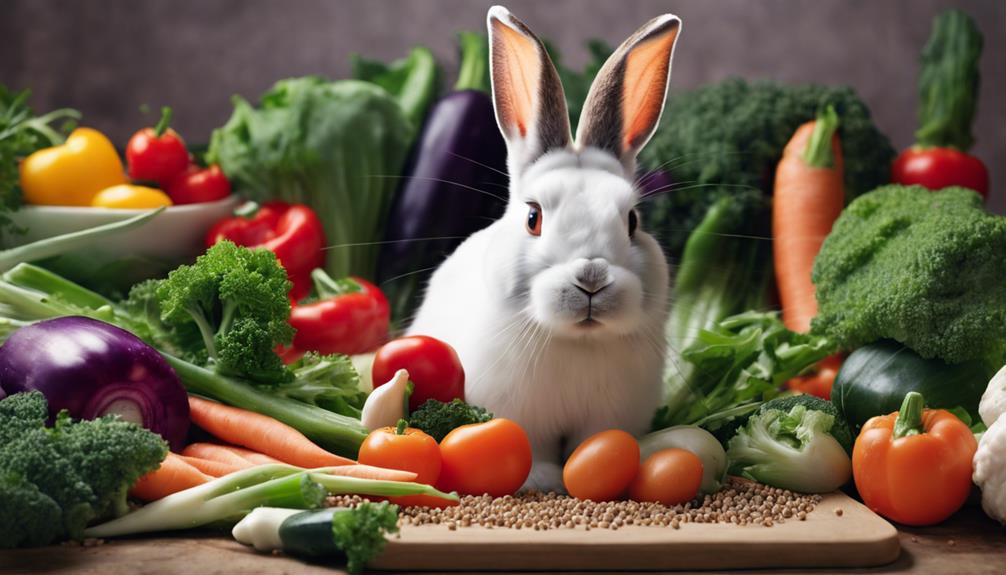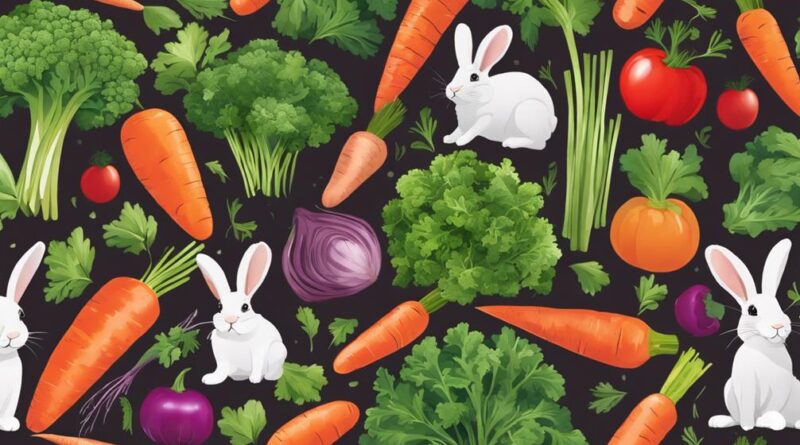Guide to Healthy Organic Diet Options for Rabbits
When it comes to your rabbit's diet, the choice between conventional and organic options can significantly impact their overall well-being. Have you ever wondered about the key differences and benefits of opting for an organic diet for your furry companion?
Understanding the importance of quality nutrition for your rabbit is just the beginning of ensuring a healthy and thriving lifestyle. So, let's explore the world of healthy organic diet options tailored specifically to meet your rabbit's unique dietary needs.
Benefits of Organic Rabbit Food
When choosing rabbit food, opting for organic options can provide numerous health benefits to your furry friend. Organic farming benefits extend beyond just the absence of synthetic pesticides and fertilizers. By choosing organic rabbit food, you're ensuring that your pet consumes produce grown without the use of harmful chemicals. This means fewer toxins are entering your rabbit's system, promoting better overall health and well-being.
Moreover, the environmental impact of choosing organic rabbit food is significant. Organic farming practices promote soil health, water conservation, and reduce pollution. By supporting organic agriculture, you're contributing to a more sustainable food system that benefits not only your rabbit but the planet as a whole. When organic methods are used, there's a decrease in soil erosion, water contamination, and overall environmental degradation. This means that the food you feed your rabbit has a lower impact on the earth's ecosystems.
Types of Organic Greens for Rabbits
Choosing organic greens for your rabbit's diet ensures they receive essential nutrients without harmful chemicals. When it comes to selecting the best greens for your furry friend, consider growing organic varieties in your garden or sourcing them from local farmers. This way, you can guarantee the freshness and quality of the greens you provide.
Organic greens offer a seasonal variety that can keep your rabbit's diet interesting and nutritionally balanced throughout the year. In the spring and summer, you can offer leafy greens like kale, arugula, and dandelion greens. These greens are rich in vitamins and minerals that can support your rabbit's overall health. During the fall and winter, you can switch to heartier options like bok choy, cilantro, and parsley to keep your rabbit satisfied.
Organic Pellets for Balanced Nutrition
Consider incorporating organic pellets into your rabbit's diet to ensure they receive balanced nutrition year-round. When choosing organic pellets for your rabbit, you'll find various pellet varieties available in the market. These pellet varieties are specifically formulated to provide the essential nutrients your rabbit needs to thrive. Look for options that are high in fiber, as this is crucial for maintaining good digestive health in rabbits.
Nutritional balance is key when it comes to your rabbit's diet, and organic pellets can play a significant role in achieving this balance. These pellets are designed to contain a mix of vitamins, minerals, and other essential nutrients that may sometimes be lacking in your rabbit's hay or fresh greens. By including organic pellets in your rabbit's daily meals, you can help ensure they're getting a well-rounded diet that meets all their nutritional requirements.
When introducing organic pellets into your rabbit's diet, it's important to do so gradually to allow your rabbit's digestive system to adjust. Start by mixing small amounts of pellets with their current food and gradually increase the pellet portion over time. This gradual transition will help prevent any digestive upsets and allow your rabbit to adapt to the new food easily. Remember, organic pellets should complement a diet rich in hay and fresh greens to provide your rabbit with a complete and balanced nutrition plan.
Importance of Organic Hay in Diet
To ensure a well-rounded diet for your rabbit, incorporating organic hay is essential for providing the necessary fiber and nutrients they need to maintain optimal health. Hay quality plays a crucial role in your rabbit's digestion. Opt for organic hay to ensure it's free from pesticides and harmful chemicals that could disrupt your rabbit's digestive system. High-quality organic hay promotes healthy gut function, preventing issues like GI stasis.
Offering a variety of hay types is beneficial for your rabbit's overall well-being. Different hays, such as timothy, orchard grass, or meadow hay, provide various textures and flavors, encouraging natural foraging behaviors. This diversity not only keeps your rabbit mentally stimulated but also ensures they receive a wide range of nutrients.
Organic hay is an excellent source of roughage, essential for maintaining dental health in rabbits. Chewing on hay helps wear down their continuously growing teeth, preventing dental problems that may arise if their teeth become overgrown. Additionally, the act of chewing hay promotes saliva production, aiding in proper digestion.
Incorporating organic hay into your rabbit's diet is a simple yet effective way to support their health. Ensure you provide a constant supply of fresh hay, clean water, and monitor your rabbit's hay consumption to ensure they're getting adequate nutrition for a happy and healthy life.
Organic Vegetables for Rabbit Health
For optimal health and nutrition, include a variety of organic vegetables in your rabbit's diet. Organic vegetables offer essential vitamins, minerals, and fiber that are vital for your bunny's well-being.
Here are some options to consider:
- Organic carrot varieties: Carrots are a favorite among rabbits, and offering different organic varieties such as purple, yellow, or white carrots can provide a range of nutrients and flavors for your furry friend. Carrots are rich in beta-carotene, which supports good vision and overall immune health in rabbits.
- Nutritional organic herbs: Incorporating organic herbs like parsley, cilantro, or dill into your rabbit's diet can't only add variety but also offer additional nutrients and digestive benefits. These herbs are rich in antioxidants and essential vitamins that can help boost your rabbit's overall health.
- Leafy greens: Include organic leafy greens like kale, arugula, and romaine lettuce in your rabbit's vegetable rotation. These greens are packed with essential nutrients like calcium and vitamin K, which are crucial for maintaining strong bones and overall health in rabbits.
- Bell peppers: Organic bell peppers are a great source of vitamin C and fiber for your rabbit. The crunchy texture can also help with wearing down their teeth naturally, promoting good dental health.
Organic Fruits as Occasional Treats
When it comes to your rabbit's diet, incorporating organic fruits as occasional treats can add a sweet and nutritious element to their meals. While vegetables are a staple, fruits can offer variety and additional nutrients. However, it's crucial to ensure a nutritional balance and practice moderation in treats.
Organic fruits like apples, bananas, and berries can be excellent choices for your rabbit's occasional treats. These fruits aren't only tasty but also provide essential vitamins and minerals that contribute to your rabbit's overall health. For example, apples are rich in fiber and vitamin C, while bananas offer potassium and vitamin B6. Berries, such as strawberries and blueberries, contain antioxidants that support the immune system.
To maintain a nutritional balance, it's essential to offer fruits in moderation. Treats should only account for a small portion of your rabbit's diet, with the majority still consisting of hay, fresh vegetables, and pellets. Limit fruit treats to a few small pieces a couple of times a week to prevent digestive issues and ensure that your rabbit's diet remains balanced.
Tips for Switching to Organic Diet

Consider incorporating organic options gradually into your rabbit's diet to ensure a smooth transition and maximize the benefits of a healthier choice. Making sudden changes can upset your rabbit's digestive system, so take it slow by mixing organic foods with their current diet.
Here are some tips to help you transition smoothly:
- Start Slow: Introduce organic foods slowly by mixing them with your rabbit's current diet. Gradually increase the proportion of organic foods over a week or two.
- Monitor Digestion: Keep an eye on your rabbit's digestion during the transition period. Watch for any signs of gastrointestinal distress like diarrhea or constipation.
- Provide Variety: Offer a variety of organic vegetables and herbs to ensure your rabbit gets a balanced diet. This variety will also keep mealtime interesting for your furry friend.
- Consult a Vet: If you have any concerns or questions about switching to an organic diet, consult your veterinarian. They can provide guidance specific to your rabbit's health needs.
Buying Organic Rabbit Food
Ease your transition to incorporating organic options by selecting high-quality rabbit food that meets organic standards. When buying organic rabbit food, prioritize organic hay benefits. Organic hay is free from pesticides and chemicals, providing essential nutrients and fiber for your rabbit's digestive health. Look for organic hay options such as timothy hay, orchard grass, or meadow hay to ensure a balanced diet for your furry friend.
In addition to organic hay, consider incorporating organic rabbit treats into your pet's diet. Organic rabbit treats are a great way to provide additional nutrients and variety while avoiding harmful additives. Look for treats made from organic ingredients like fruits, vegetables, or herbs to offer your rabbit a tasty and healthy snack option. Remember to feed treats in moderation to maintain a balanced diet for your rabbit.
When purchasing organic rabbit food, read the labels carefully to ensure that the product meets organic standards. Look for certifications from reputable organizations that guarantee the quality and integrity of the ingredients used. By choosing organic rabbit food that prioritizes your pet's health and well-being, you can provide them with the best nutrition possible for a happy and thriving rabbit.
Frequently Asked Questions
Can Rabbits Eat Organic Flowers as Part of Their Diet?
Yes, rabbits can eat organic flowers as part of their diet. Edible flowers provide additional nutrition for rabbits and can be a tasty treat.
Ensure the organic flower arrangements are safe for rabbits to consume, free from pesticides or harmful chemicals. Introduce flowers gradually into their diet to monitor any digestive reactions.
Are There Any Specific Organic Herbs That Are Beneficial for Rabbits?
When considering organic herbs for your rabbit's diet, think about the herbal benefits for rabbit health. Including organic flowers can add dietary variety.
Some beneficial organic herbs for rabbits are parsley, dill, cilantro, and basil. These herbs not only offer a tasty addition to their diet but also provide essential nutrients and promote overall well-being.
Remember to introduce new herbs gradually to ensure your rabbit adjusts well to the dietary change.
How Should Organic Treats Be Incorporated Into a Rabbit's Diet Without Causing Health Issues?
When adding organic treats to your rabbit's diet, remember to consider training tips and treat alternatives. Focus on portion control and maintaining nutritional balance to prevent health issues.
Introduce treats gradually, and monitor your rabbit's reaction. You can use organic fruits or veggies as treats or explore commercial options.
Are There Any Organic Supplements Recommended for Rabbits on an Organic Diet?
When caring for your rabbit on an organic diet, consider incorporating organic hay and pellets. These are essential for meeting their nutritional needs.
Additionally, organic supplements like haylage can provide extra nutrients. Ensure these supplements are organic to maintain the integrity of your rabbit's diet.
Remember to consult with a veterinarian to determine the best organic options for your furry friend's health and well-being.
What Are Some Common Mistakes to Avoid When Transitioning a Rabbit to an Organic Diet?
When transitioning your rabbit to an organic diet, be cautious. Start slow to prevent digestive issues. Avoid sudden changes, opt for gradual shifts.
Watch out for processed organic foods; fresh is best. Check for any hidden sugars or additives. Stick to organic veggies and grass hay. Ensure your rabbit gets enough fiber.
Conclusion
In conclusion, feeding your rabbit a healthy organic diet is essential for their overall well-being. By incorporating organic greens, pellets, hay, vegetables, and occasional fruits into their diet, you're providing them with the necessary nutrients for a balanced diet.
Remember to gradually switch to organic options and ensure you're buying high-quality organic rabbit food to support their health and vitality. Your furry friend will thank you for it!
